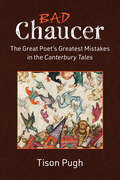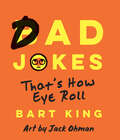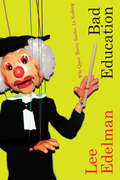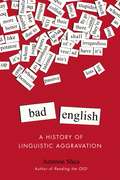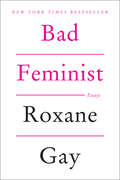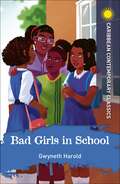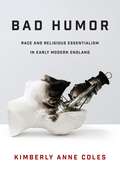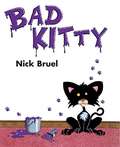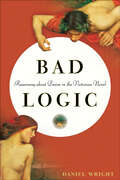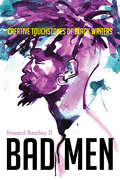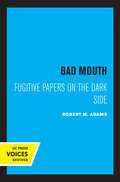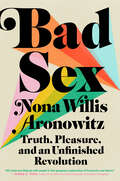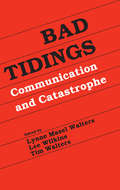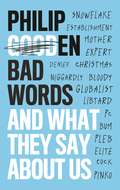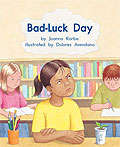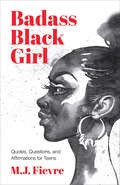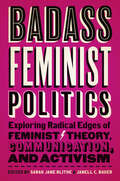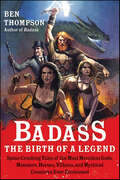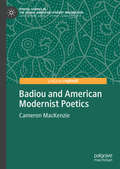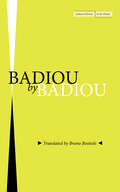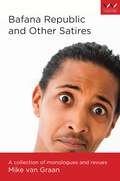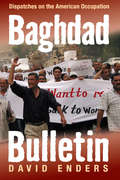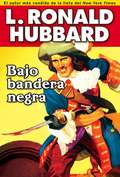- Table View
- List View
Bad Chaucer: The Great Poet’s Greatest Mistakes in the Canterbury Tales
by Tison PughAcclaimed for centuries as the “Father of English Literature,” Geoffrey Chaucer enjoys widespread and effusive praise for his classic Canterbury Tales—and rightfully so. Still, even the greatest of authors cannot claim perfection, and so Bad Chaucer: The Great Poet’s Greatest Mistakes in the Canterbury Tales analyzes his various missteps, missed opportunities, and other blunders in this peerless masterpiece. From a vexing catalog of trees in the Knight’s Tale to the flirtations with blasphemy in the Parson’s Tale, this volume progresses through the Canterbury Tales story by story, tale by tale, pondering the most egregious failing of each in turn. Viewed collectively, Chaucer’s troubles stem from clashing genres that disrupt interpretive clarity, themeless themes that undermine any message a tale might convey, mischaracterized characters who act without clear motivation, purposeful and otherwise pleasureful badness that show Chaucer’s appreciation for the humor of bad literature, and outmoded perspectives that threaten to alienate modern readers. Badness is not always to be lamented but often celebrated, even cherished, for badness infuses artistic creations with the vitality that springs from varied responses, spirited engagements, and the inherent volatility of enjoying literature. On the whole, Bad Chaucer: The Great Poet’s Greatest Mistakes in the Canterbury Tales swerves literary criticism in a new direction by examining the provocative question, for too long overlooked, of what this great author got wrong.
Bad Dad Jokes: That's How Eye Roll
by Bart KingA goofy book celebrating the Dad Joke lifestyle?packed with jokes and wordplay for your favorite punster.Bart King’s Bad Dad Jokes covers every aspect of the most simultaneously loathed and beloved joke form of all time: the pun. Because “Dad Humor” should be practiced by everyone (regard-less of age, gender, or family status) this book serves to encourage creative thinking and pun-ning habits for everyone!Learn how to properly deliver a pun (whether written, visual, or verbal) and how to pretend you’re sorry for your Dad Joke (even when you’re not). Includes: quality pre-loaded puns, the taxonomy of the different types of wordplay, famous punsters, and Great Moments in Dad Joke History.Featuring illustrations by Pulitzer Prize–winning cartoonist Jack Ohman.
Bad Education: Why Queer Theory Teaches Us Nothing (Theory Q)
by Lee EdelmanLong awaited after No Future, and making queer theory controversial again, Lee Edelman’s Bad Education proposes a queerness without positive identity—a queerness understood as a figural name for the void, itself unnamable, around which the social order takes shape. Like Blackness, woman, incest, and sex, queerness, as Edelman explains it, designates the antagonism, the structuring negativity, preventing that order from achieving coherence. But when certain types of persons get read as literalizing queerness, the negation of their negativity can seem to resolve the social antagonism and totalize community. By translating the nothing of queerness into the something of “the queer,” the order of meaning defends against the senselessness that undoes it, thus mirroring, Edelman argues, education’s response to queerness: its sublimation of irony into the meaningfulness of a world. Putting queerness in relation to Lacan’s “ab-sens” and in dialogue with feminist and Afropessimist thought, Edelman reads works by Shakespeare, Jacobs, Almodóvar, Lemmons, and Haneke, among others, to show why queer theory’s engagement with queerness necessarily results in a bad education that is destined to teach us nothing.
Bad English
by Ammon SheaThe author of Reading the OED presents an eye-opening look at language "mistakes" and how they came to be accepted as correct--or not. English is a glorious mess of a language, cobbled together from a wide variety of sources and syntaxes, and changing over time with popular usage. Many of the words and usages we embrace as standard and correct today were at first considered slang, impolite, or just plain wrong. Whether you consider yourself a stickler, a nitpicker, or a rule-breaker in the know, Bad English is sure to enlighten, enrage, and perhaps even inspire. Filled with historic and contemporary examples, the book chronicles the long and entertaining history of language mistakes, and features some of our most common words and phrases, including: Decimate Hopefully Enormity That/which Enervate/energize Bemuse/amuse Literally/figuratively Ain't Irregardless Socialist OMG Stupider Lively, surprising, funny, and delightfully readable, this is a book that will settle arguments among word lovers--and it's sure to start a few, too.
Bad Feminist: Essays
by Roxane Gay“Roxane Gay is so great at weaving the intimate and personal with what is most bewildering and upsetting at this moment in culture. She is always looking, always thinking, always passionate, always careful, always right there.” — Sheila Heti, author of How Should a Person Be?A New York Times BestsellerBest Book of the Year: NPR • Boston Globe • Newsweek • Time Out New York • Oprah.com • Miami Herald • Book Riot • Buzz Feed • Globe and Mail (Toronto) • The Root • Shelf AwarenessA collection of essays spanning politics, criticism, and feminism from one of the most-watched cultural observers of her generationIn these funny and insightful essays, Gay takes us through the journey of her evolution as a woman (Sweet Valley High) of color (The Help) while also taking readers on a ride through culture of the last few years (Girls, Django in Chains) and commenting on the state of feminism today (abortion, Chris Brown). The portrait that emerges is not only one of an incredibly insightful woman continually growing to understand herself and our society, but also one of our culture.Bad Feminist is a sharp, funny, and spot-on look at the ways in which the culture we consume becomes who we are, and an inspiring call-to-arms of all the ways we still need to do better, coming from one of our most interesting and important cultural critics.
Bad Girls in School
by Gwyneth HaroldThere have been many great and enduring works of literature by Caribbean authors over the last century. The Caribbean Contemporary Classics collection celebrates these deep and vibrant stories, overflowing with life and acute observations about society.Three girls are on the brink of expulsion from the respected Redeemer College: 'Failure to complete term assignments, ... using foul language ... stealing another student's cell phone ... persistent lateness for English classes. Breaching the behaviour code ...' Katreena, Ta Jeeka and Caledonia are about to be written off. This insightful book unsentimentally exposes the fault lines through society, and the deep effects they have on individuals. It describes the choices people make and the decisions they feel forced in to. Maturing into young adulthood, these girls each have to make, or lose, their way, in their own way. What difference can one teacher make?
Bad Girls in School (Caribbean Modern Classics)
by Gwyneth HaroldThere have been many great and enduring works of literature by Caribbean authors over the last century. The Caribbean Contemporary Classics collection celebrates these deep and vibrant stories, overflowing with life and acute observations about society.Three girls are on the brink of expulsion from the respected Redeemer College: 'Failure to complete term assignments, ... using foul language ... stealing another student's cell phone ... persistent lateness for English classes. Breaching the behaviour code ...' Katreena, Ta Jeeka and Caledonia are about to be written off. This insightful book unsentimentally exposes the fault lines through society, and the deep effects they have on individuals. It describes the choices people make and the decisions they feel forced in to. Maturing into young adulthood, these girls each have to make, or lose, their way, in their own way. What difference can one teacher make?
Bad Humor: Race and Religious Essentialism in Early Modern England
by Kimberly Anne ColesRace, in the early modern period, is a concept at the crossroads of a set of overlapping concerns of lineage, religion, and nation. In Bad Humor, Kimberly Anne Coles charts how these concerns converged around a pseudoscientific system that confirmed the absolute difference between Protestants and Catholics, guaranteed the noble quality of English blood, and justified English colonial domination.Coles delineates the process whereby religious error, first resident in the body, becomes marked on the skin. Early modern medical theory bound together psyche and soma in mutual influence. By the end of the sixteenth century, there is a general acceptance that the soul's condition, as a consequence of religious belief or its absence, could be manifest in the humoral disposition of the physical body. The history that this book unfolds describes developments in natural philosophy in the early part of the sixteenth century that force a subsequent reconsideration of the interactions of body and soul and that bring medical theory and theological discourse into close, even inextricable, contact. With particular consideration to how these ideas are reflected in texts by Elizabeth Cary, John Donne, Ben Jonson, William Shakespeare, Edmund Spenser, Mary Wroth, and others, Coles reveals how science and religion meet nascent capitalism and colonial endeavor to create a taxonomy of Christians in Black and White.
Bad Kitty (Bad Kitty)
by Nick BruelNIMAC-sourced textbook <P><P>From the creator of The New York Times bestseller Boing! comes Bad Kitty, the riotous story of a cat gone berserk -- four times over an in alphabetical order each time. Kitty is not happy hen she's told that her favorite foods are all gone and all that's left are Asparagus, Beets, Cauliflower, Dill...and 22 other equally unappealing vegetables. So she: Ate my homework, Bit grandma, Clawed the curtains, Damaged the dishes, and so on, through Z. Only when tastier things arrive (an Assortment of Anchovies, Buffalo Burritos, Chicken Cheesecake...) does she Apologize to Grandma.
Bad Logic: Reasoning about Desire in the Victorian Novel
by Daniel WrightHow did the Victorians think about love and desire?"Reader, I married him," Jane Eyre famously says of her beloved Mr. Rochester near the end of Charlotte Brontë’s novel. But why does she do it, we might logically ask, after all he’s put her through? The Victorian realist novel privileges the marriage plot, in which love and desire are represented as formative social experiences. Yet how novelists depict their characters reasoning about that erotic desire—making something intelligible and ethically meaningful out of the aspect of interior life that would seem most essentially embodied, singular, and nonlinguistic—remains a difficult question.In Bad Logic, Daniel Wright addresses this paradox, investigating how the Victorian novel represented reasoning about desire without diluting its intensity or making it mechanical. Connecting problems of sexuality to questions of logic and language, Wright posits that forms of reasoning that seem fuzzy, opaque, difficult, or simply "bad" can function as surprisingly rich mechanisms for speaking and thinking about erotic desire. These forms of "bad logic" surrounding sexuality ought not be read as mistakes, fallacies, or symptoms of sexual repression, Wright asserts, but rather as useful forms through which novelists illustrate the complexities of erotic desire.Offering close readings of canonical writers Charlotte Brontë, Anthony Trollope, George Eliot, and Henry James, Bad Logic contextualizes their work within the historical development of the philosophy of language and the theory of sexuality. This book will interest a range of scholars working in Victorian literature, gender and sexuality studies, and interdisciplinary approaches to literature and philosophy.
Bad Men: Creative Touchstones of Black Writers
by Howard Rambsy Ii.How have African American writers drawn on "bad" black men and black boys as creative touchstones for their evocative and vibrant art? This is the question posed by Howard Rambsy’s new book, which explores bad men as a central, recurring, and understudied figure in African American literature, and music. By focusing on how various iterations of the bad black man figure serve as creative muse and inspiration for literary production, Rambsy puts a wide variety of contemporary African American literary and cultural works in conversation with creativity research for the first time.Employing concepts such as playfulness, productivity, divergent thinking, and problem finding, Rambsy examines the works of a wide range of writers—including Elizabeth Alexander, Amiri Baraka, Paul Beatty, Ta-Nehisi Coates, Tyehimba Jess, Trymaine Lee, Adrian Matejka, Aaron McGruder, Evie Shockley, and Kevin Young—who have drawn on notions of bad black men and boys to create innovative and challenging works in a variety of genres. Through groundbreaking readings, Rambsy demonstrates the fruitfulness of viewing black literary art through the lens of creativity research.
Bad Mouth: Fugitive Papers on the Dark Side (Quantum Books)
by Robert M. AdamsThis title is part of UC Press's Voices Revived program, which commemorates University of California Press’s mission to seek out and cultivate the brightest minds and give them voice, reach, and impact. Drawing on a backlist dating to 1893, Voices Revived makes high-quality, peer-reviewed scholarship accessible once again using print-on-demand technology. This title was originally published in 1977.
Bad Sex: Truth, Pleasure, and an Unfinished Revolution
by Nona Willis AronowitzNamed a Most Anticipated Book by Bustle, Esquire, Nylon, and The Millions&“Intimate, thoughtful, and accessible to anyone struggling with the persistent, maddening inequities of contemporary sex.&” –Rebecca Traister, New York Times bestselling author of Good and MadFrom Teen Vogue sex and love columnist Nona Willis Aronowitz, a blend of memoir, social history, and cultural criticism that probes the meaning of desire and sexual freedom today.At thirty-two years old, everything in Nona Willis Aronowitz&’s life, and in America, was in disarray. Her marriage was falling apart. Her nuclear family was slipping away. Her heart and libido were both in overdrive. Embroiled in an era of fear, reckoning, and reimagining, her assumptions of what &“sexual liberation&” meant were suddenly up for debate. In the thick of personal and political turmoil, Nona turned to the words of history&’s sexual revolutionaries—including her late mother, early radical pro-sex feminist Ellen Willis. At a time when sex has never been more accepted and feminism has never been more mainstream, Nona asked herself: What, exactly, do I want? And are my sexual and romantic desires even possible amid the horrors and bribes of patriarchy, capitalism, and white supremacy?Nona&’s attempt to find the answer places her search for authentic intimacy alongside her family history and other stories stretching back nearly two hundred years. Stories of ambivalent wives and unchill sluts, free lovers and radical lesbians, sensitive men and woke misogynists, women who risk everything for sex—who buy sex, reject sex, have bad sex and good sex. The result is a brave, bold, and vulnerable exploration of what sexual freedom can mean. Bad Sex is Nona&’s own journey to sexual satisfaction and romantic happiness, which not only lays bare the triumphs and flaws of contemporary feminism but also shines a light on universal questions of desire.
Bad Tidings: Communication and Catastrophe (Routledge Communication Series)
by Lee Wilkins Lynne Masel Walters Tim WaltersFirst Published in 1993. In the 1970s, a book collecting research about the mass media and their role in disasters would have been unimaginable. This book, then, is an attempt to compile a somewhat eclectic view of research on mass communication and catastrophe. The editors have attempted to provide a sampling of the most recent empirical work on the mass media and disasters, including everything from content analysis of media reports to studies of audience response to those events.
Bad Words: And What They Say About Us
by Philip GoodenOnce upon a time, the worst words you could utter were short, simple and tended to be four letters in length. Now things are more complicated. To be insulted as a 'snowflake' or an 'expert' is arguably worse than being called a **** or a **** or even a ****.So what are today's 'bad words' and how are they different from yesterday's taboo expressions? This entertaining guide to the shifting sands of bad language is indispensable in an increasingly divided world in which abuse becomes ever more widespread and vituperative.Philip Gooden shows how and why taboo words and contentious expressions, including those four-letter ones, were first used in English. He discusses the ways such words have changed over the years and explores how a single syllable or two may possess an almost magical power to offend, distress or infuriate. Bad Words investigates the most controversial and provocative words in the English language in a way that is both anecdotal and analytical. Combining intrigue and scandal, the book delves into expressions connected to religion, ethnicity, nationality, politics, swearing and oaths, and includes contemporary issues like political correctness and elitism.
Bad-Luck Day (Fountas & Pinnell LLI Green #Level J, Lesson 109)
by Joanna KorbaFountas and Pinnell Leveled Literacy Intervention Green System -- 1st Grade
Badass Black Girl: Quotes, Questions, and Affirmations for Teens (Badass Black Girl Ser.)
by M.J. FievreThis inspirational journal features wisdom from Black female trailblazers who have made their mark in science, sports, politics and more.Badass Black Girl is the guidebook every Black girl needs to conquer the world. This book challenges teenage girls to reflect on their role in the world, set goals despite the naysaying and prejudice of others, push past limiting boundaries, and fulfill their dreams for a badass future of then-own design. It is filled with inspirational quotes from notable Black women who challenged the status quo and set their own standards for success. It also includes personal letters and insights from the author, M.J. Fievre, a successful badass Black woman and entrepreneur in her own right.The journal’s daily affirmations and reflections are designed to help Black girls see the limitless possibilities of the future. It tackles topics such as family and friends, school and careers, body image, and stereotypes. By reflecting on these topics, girls confront the issues that can hold them back from living their best lives and finding their Black girl bliss.
Badass Feminist Politics: Exploring Radical Edges of Feminist Theory, Communication, and Activism
by Michael S. Martin Tina Harris Sarah Jane Blithe Robin M. Boylorn James McDonald Cheris Kramarae Shardé M. Davis Melanie Duckworth Janell C. Bauer Angela N. Gist-Mackey Ashley R. Hall Anita Mixon Andrea Ewing Prisca S. Ngondo Cerise L. Glenn Kelly J. Cross Idrissa Snider Rebecca Mercado Jones Jayna Marie Jones Siobhan Smith-Jones Johnny L. Jones Savaughn Williams Cassidy D. Ellis Sarah Gonzalez Noveiri Ruth J. Beerman Lydia Huerta Moreno Ana Gomez Parga Maureen Ebben Kathleen Rushforth Sara DeTurk Danette M. Pugh-Patton Antonio L. Spikes Jenna N. HancheyIn the late 2010s, the United States experienced a period of widespread silencing. Protests of unsafe drinking water have been met with tear gas; national park employees, environmentalists, and scientists have been ordered to stop communicating publicly. Advocates for gun control are silenced even as mass shootings continue. Expressed dissent to political power is labeled as “fake news.” DREAMers, Muslims, Trans military members, women, black bodies, the LGBTQI+ community, Latina/o/x communities, rape survivors, sex workers, and immigrants have all been systematically silenced. During this difficult time and despite such restrictions, advocates and allies persist and resist, forming dialogues that call to repel inequality in its many forms. Addressing the oppression of women of color, white women, women with (dis)abilities, and LBTQI+ individuals across cultures and contexts remains a central posit of feminist struggle and requires “a distinctly feminist politics of recognition.” However, as second wave debates about feminism have revealed, there is no single way to express a feminist politic. Rather, living feminist politics requires individual interpretation and struggle, collective discussion and disagreement, and recognizing difference among women as well as points of convergence in feminist struggle. Badass Feminist Politics includes a diverse range of engaging feminist political projects to not only analyze the work being done on the ground but provide an overview for action that can be taken on by those seeking to engage in feminist activism in their own communities. Contributors included here are working for equality and equity and resisting violent, racist, homophobic, transphobic, xenophobic, and sexist language and action during this tension-filled political moment. Collectively, the book explores what it means to live and communicate feminist politics in everyday choices and actions, and how we can facilitate learning by analyzing these examples. Taking up current issues and new theoretical perspectives, the authors offer novel perspectives into what it means to live feminist politics. This book is a testament to resilience, resistance, communication, and forward thinking about what these themes all mean for new feminist agendas. Learning how to resist oppressive structures through words and actions is particularly important for students. Badass Feminist Politics features scholars from non-dominant groups taking up issues of marginalization and oppression, which can help people accomplish their social justice goals of inclusivity on the ground and in the classroom.
Badass: Spine-crushing Tales Of The Most Merciless Gods, Monsters, Heroes, Villains, And Mythical Creatures Ever Envisioned (Badass Series)
by Ben ThompsonBen Thompson—author of Badass, creator of the epic website badassoftheweek.com, and the Internet’s foremost expert on badassitude—is back to enthrall lovers of skull-smashing, bone-crushing bad behavior with his latest compendium, Badass: The Birth of a Legend. Like its macho predecessor, Badass: The Birth of a Legend celebrates fearless berserkers of every stripe, male and female, but this time pulls them from the hoary pages of mythology, fantasy fiction, and the silver screen—from Zeus to Beowulf to Dirty Harry Callahan, the most merciless gods, monsters, heroes, villains, and mythical creatures ever envisioned. Forget your whiny Twilight vampires and werewolves, these badasses kick butt!
Badiou and American Modernist Poetics (Pivotal Studies In The Global American Literary Imagination Ser.)
by Cameron MacKenzieBadiou and American Modernist Poetics explores the correspondence between Alain Badiou's thinking on art and that of the canonical modernists T.S. Eliot, Wallace Stevens, and Ezra Pound. Utilizing a multidisciplinary approach, the text engages with themes of the void, mastery, and place present in both modernist poetry and in Badiou’s philosophy. Through an examination of classic modernist texts, Cameron MacKenzie reveals that where Badiou hopes to go, the modernists have already been.
Badiou by Badiou (Cultural Memory in the Present)
by Alain BadiouAn accessible introduction to Badiou's key ideas In this short and accessible book, the French philosopher Alain Badiou provides readers with a unique introduction to his system of thought, summed up in the trilogy of Being and Event, Logics of Worlds, and The Immanence of Truths. Taking the form of an interview and two talks and keeping in mind a broad audience without any prior knowledge of his work, the book touches upon the central concepts and major preoccupations of Badiou's philosophy: fundamental ontology, mathematics, politics, poetry, and love. Well-chosen examples illuminate his thinking in regards to being and universality, worlds and singularity, and the infinite and the absolute, among other topics. A veritable tour de force of pedagogical clarity, this new student-friendly work is perhaps the single best general introduction to the work of this prolific and committed thinker. If, for Badiou, the task of philosophy consists in thinking through the truths of our time, the texts collected in this small volume could not be timelier.
Bafana Republic and Other Satires: A collection of monologues and revues
by Mike van GraanThis collection of satirical sketches takes readers on a sometimes cynical, sometimes hilarious trip through many of the issues that face democratic South AfricaThe seed of this collection was sown in 2007 when South Africa won the right to host the 2010 FIFA World Cup. The debate about huge amounts of public funds being spent on a 'vanity project' instead of being used to improve the lives of the majority of the country’s citizens inspired Mike van Graan, one of South Africa's leading contemporary political playwrights, to use sport as an entry point for satirical commentary. Van Graan follows this with piercing attention towards matters of the state. With themes ranging from the World Cup to the political football of land, from the violent abuse of women to state capture, this selection of satirical sketches takes readers on a rollercoaster trip through many of the issues that face democratic South Africa. The sketches come from six one-person revues, Bafana Republic (2007), Bafana Republic: Extra Time (2008), Bafana Republic: Penalty Shootout (2009), Pay Back the Curry (2016), State Fracture (2017) and Land Acts (2018). Van Graan uses a potent mix of comedy, poetry and drama to make points that hit hard at core issues which 21st-century South Africans are struggling with. Readers will laugh and cringe and sometimes cry, but one thing they will not be able to do is remain unaffected.
Baghdad Bulletin: Dispatches on the American Occupation
by David EndersBaghdad Bulletin is a street-level account of the war and turbulent postwar period as seen through the eyes of the young independent journalist David Enders. The book recounts Enders's story of his decision to go to Iraq, where he opened the only English-language newspaper completely written, printed, and distributed there during the war. Young, courageous, and anti-authoritarian, Enders is the first reporter to cover the war as experienced by ordinary Iraqis. Deprived of the press credentials that gave his embedded colleagues access to press conferences and officially sanitized information, Enders tells the story of a different war, outside the Green Zone. It is a story in which the struggle of everyday life is interspersed with moments of sheer terror and bizarre absurdity: wired American troops train their guns on terrified civilians; Iraqi musicians prepare a recital for Coalition officials who never show; traveling clowns wreak havoc in a Baghdad police station. Orphans and intellectuals, activists and insurgents: Baghdad Bulletin depicts the unseen complexity of Iraqi society and gives us a powerful glimpse of a new kind of warfare, one that coexists with-and sometimes tragically veers into-the everyday rhythms of life.
Bajo bandero negra
by L. Ronald HubbardMucho antes de que el capitán Jack Sparrow provocara un infierno con Piratas del Caribe, Tom Bristol navegó a los infiernos y regresó bajo bandera negra. Ha estado a las órdenes del látigo del cruel capitán. Ha sido acusado de asesinato. Y lo han abandonado para que muera en una isla desierta. Pero su suerte está a punto de cambiar. Junto con una mujer intrépida y una astuta tripulación, iza una bandera pirata propia, dispuesto a hacer el amor y la guerra en los mares.
